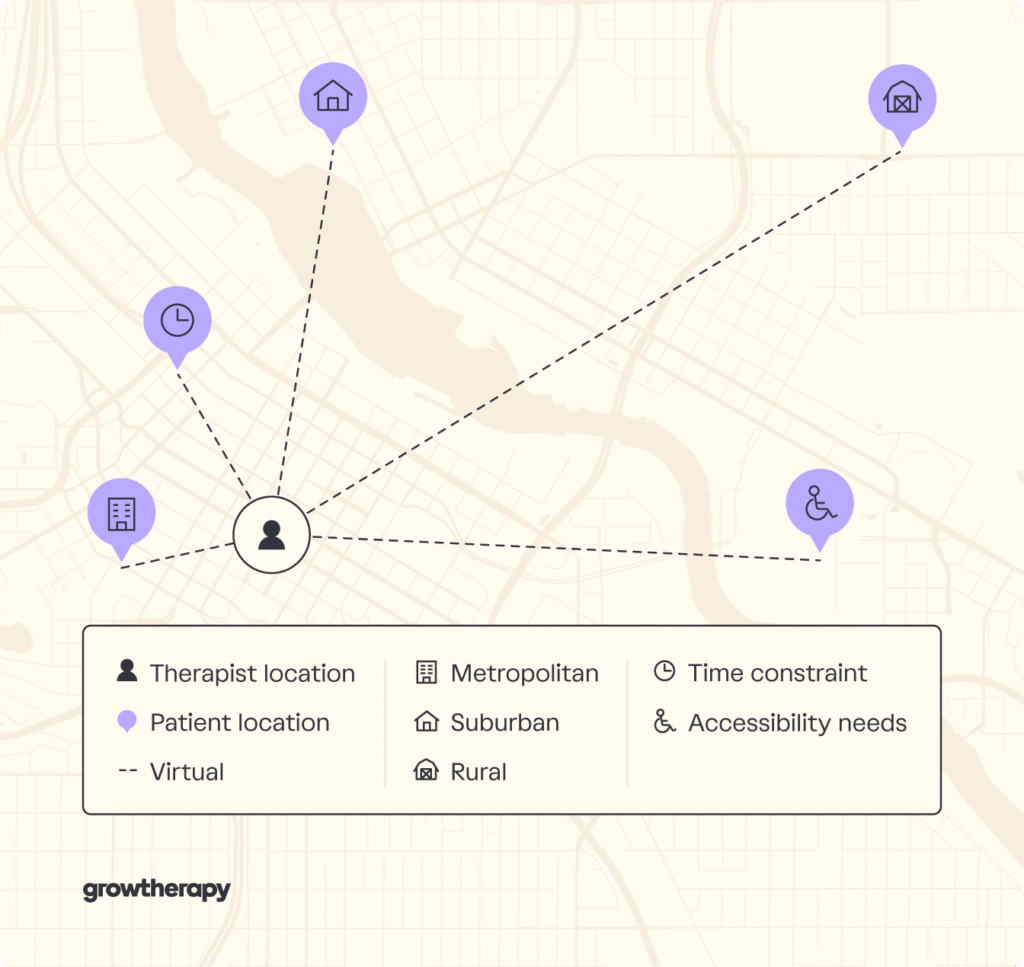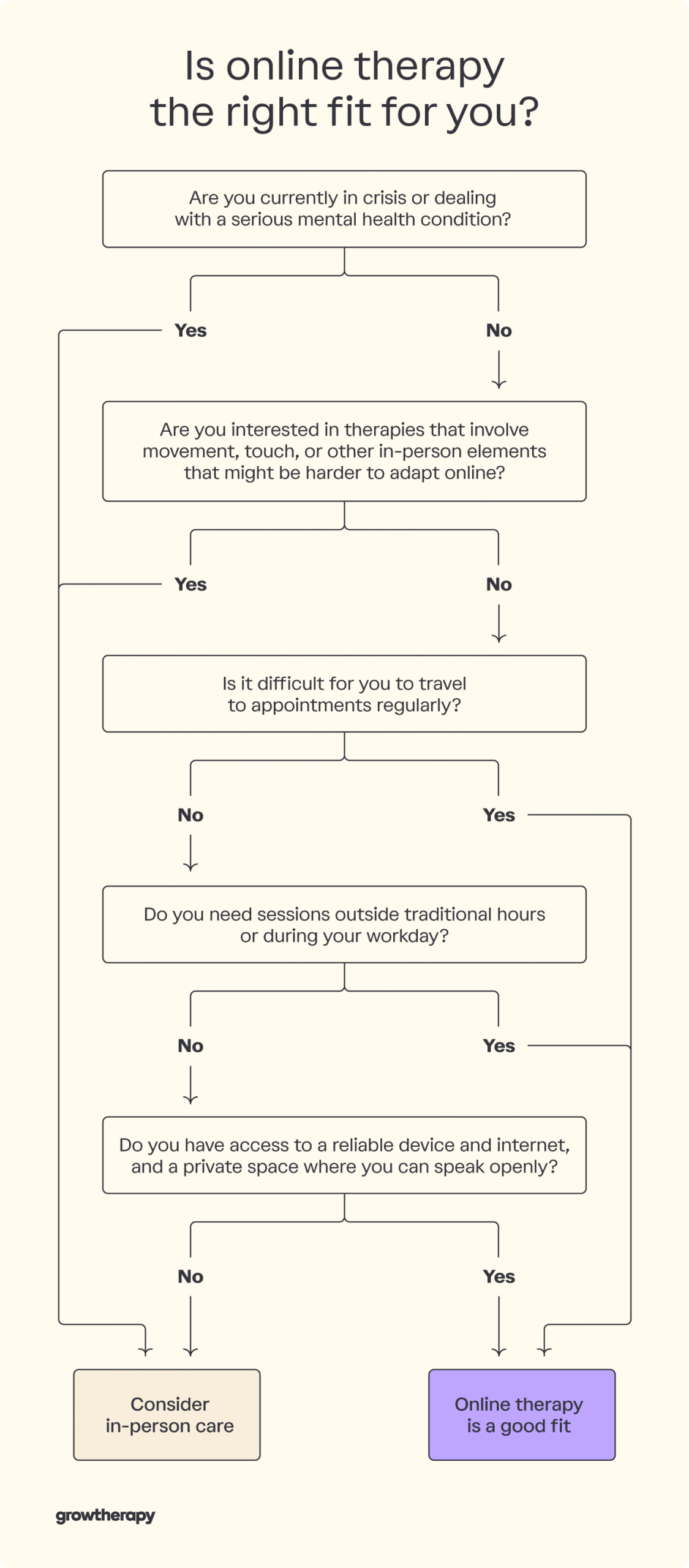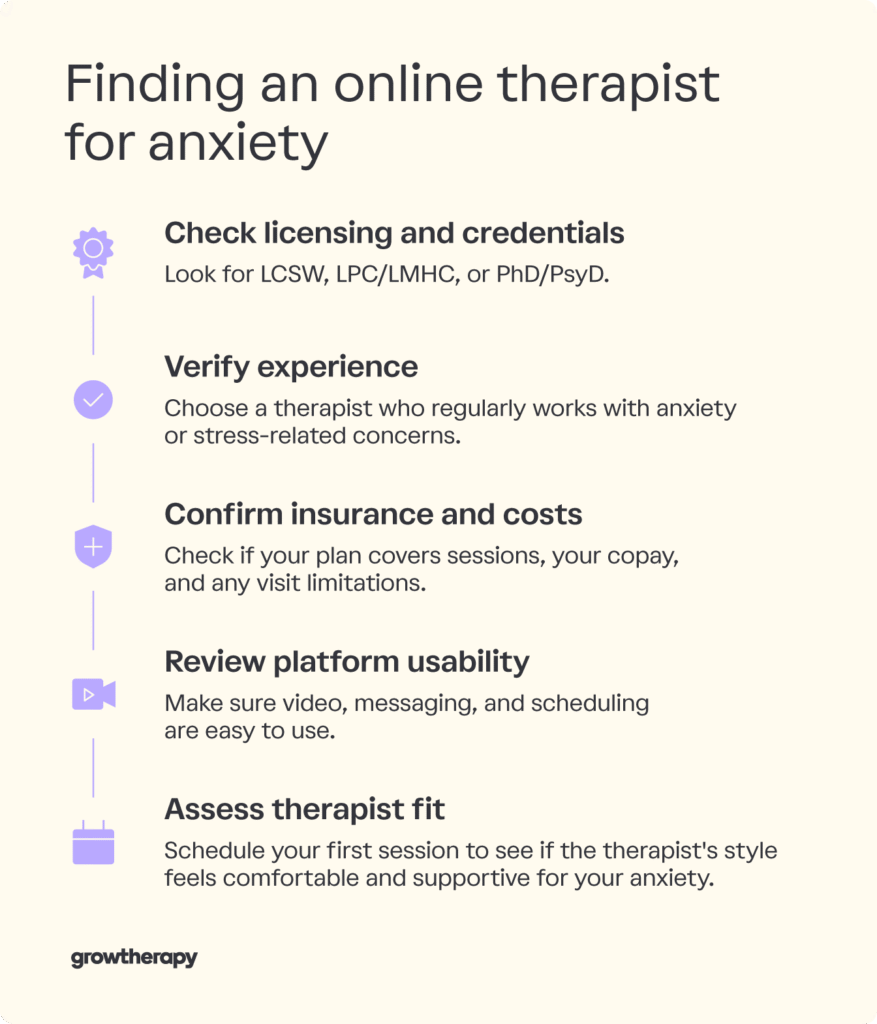Almost anything can be done online these days, from grocery shopping to workout classes and everything in between. It’s no surprise that therapy is being offered online, too. But its rising popularity has some people asking: “Is online therapy effective?”
It’s a fair question. After all, mental health support is important, and you want to feel confident that it works before committing. In this guide, we’ll walk through what research says, the benefits and limitations of online therapy, and tips for finding a therapist that works for you.
What the research says
Fortunately, there’s plenty of research exploring how well online therapy works. Studies show that for many common mental health concerns, it works just as well as traditional in-person sessions.
For example, a 2024 study in JAMA Network Open found that among veterans receiving mental health care, facilities with higher levels of telehealth use had fewer suicide-related events. This suggests that when telehealth is accessible and integrated into care, it may help reduce suicide risk.
Similarly, according to an internal 2024 Grow Therapy client survey of clients who had been in therapy for at least three months:
- 76% said it was easy to find the right provider
- 67% paid less than they expected
- 81% reported feeling better since starting therapy
These results make one thing clear: online therapy is both accessible and highly effective.
Benefits of online therapy
Getting help for your mental health isn’t always simple. Online therapy can take some of the stress out of the process by giving you more options to get the care you need. Let’s take a look at the benefits of online therapy.
Improved accessibility for patients

Traveling to appointments can be a significant obstacle for individuals living in rural or remote areas or those without reliable transportation. Online therapy allows clients to connect with a therapist from anywhere, whether that’s a different city or from the comfort of their home.
Online therapy also opens doors for traditionally underserved communities where mental health resources may be limited. In areas with few local providers, it can be hard to find someone who’s available or has the specialty you need. Virtual sessions expand the pool of options, helping people find the right fit without being restricted by geography.
People with mobility challenges or chronic illnesses also benefit from the accessibility of online therapy. Being able to join sessions from home makes attending regularly much easier.
Private setting
Therapy is a vulnerable process, and for many people, privacy plays a big role in feeling safe enough to open up. Meeting with a therapist from home removes the stress of waiting rooms or the distractions of a busy office, creating a more comfortable and private space to talk. That sense of control over where and how sessions happen can make it easier to relax and share what’s really on your mind.
And while comfort matters, so does security. Online mental health platforms, like Grow Therapy, utilize encrypted technology and adhere to HIPAA guidelines to safeguard your sessions, ensuring that what you share remains confidential between you and your therapist. Feeling that trust and safety helps people open up more freely and get the most out of each session.
Flexible scheduling
Many people put off therapy because it’s hard to fit into an already packed schedule. Online sessions make it much easier to work appointments into your day, whether it’s during a lunch break, early in the morning, or after the kids are in bed. Platforms like Grow Therapy help you find therapists who offer evening and weekend appointments, so you can stick to a routine without rearranging your whole day.
This flexibility is especially helpful for people who work remotely or in a hybrid setup. Sessions can fit right into a workday without the stress of commuting or breaking focus.
Potentially more affordable care
Online options can also make the cost of therapy more manageable. Because online therapy can reduce certain costs, like commuting and time away from work, some clients find it more affordable than traditional in‑person sessions.
Online networks also give people more ways to find therapy that fits their budget. Through Grow Therapy, clients can see clear per-session pricing and filter by their insurance plan before booking. Grow accepts more than 100 insurance plans, and most clients who use insurance pay around $21 per session. That kind of transparency helps people plan for care with confidence and fewer financial surprises.
When online therapy may not be the best option

While online therapy works well for many people, there are times when in-person care might be a better fit. If someone is dealing with a serious mental health condition or is in crisis, having face-to-face support can provide an extra layer of safety and guidance. In-person sessions may also be helpful if part of your goal is to get out of the house more, engage socially, or work on challenges related to isolation.
Some types of therapy also just work better in person. Treatments that rely on hands-on techniques, like certain trauma-focused interventions or somatic techniques, are often more effective when done face-to-face. Or therapies that use specialized equipment, such as neurofeedback, can be hard to replicate online.
The good news is you don’t have to pick just one. Services like Grow Therapy connect you to providers offering both online and in-person sessions, letting you explore what works best for you.
How to choose the right online therapist or platform
If you decide online therapy is the right fit, the next question is: Where do you start? A good approach is to start by narrowing down which platform meets your needs, then finding a therapist who feels right for you.
- Check insurance coverage and budget. Before browsing therapists, look for networks that accept your insurance. Many, like Grow Therapy, let you search by plan so you can see which providers are covered.
- Evaluate platform features and usability. Look at the platform’s website or app before signing up. Check how sessions are conducted (video, phone, messaging) and what scheduling options are offered. Many have FAQs, demo videos, or support teams you can contact to see if it will meet your needs.
- Confirm therapist credentials. Once you’ve chosen a platform, review therapist profiles to make sure they’re licensed in your state and trained in the type of therapy you’re seeking.
- Assess personal fit. If available, read therapist bios or watch introduction videos to determine if the therapist feels like a good fit.
Once you’ve found a potential option or two, your first session is a great time to get a feel for your therapist’s style and approach. Don’t be afraid to ask questions about how sessions usually go or anything else that matters to you, so you feel comfortable moving forward.

Grow Therapy: Making online therapy work for you
Both research and real-world experience show that online therapy can help many people manage common mental health concerns, all while fitting into busy lives. It offers flexibility, comfort, and the chance to connect with a licensed therapist you feel at ease with.
With Grow Therapy, you can easily explore both virtual and in-person sessions, check which insurance plans are accepted, and find the best therapist for your needs. That way, you can focus on getting support in a way that works for your schedule and your budget. Take the next step by finding a therapist who’s right for you.
